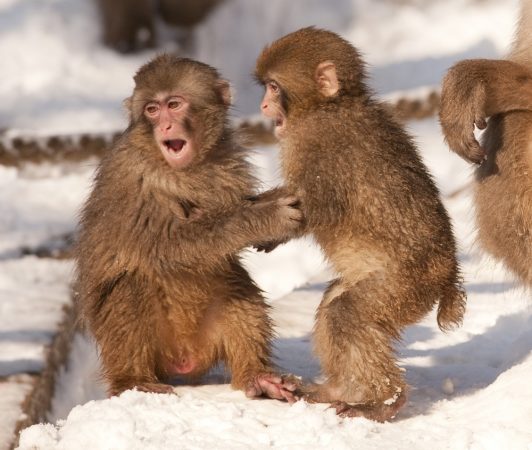Monkeys’ mistake detector
Specific brain cells in macaques respond to fellow animal’s error
By Roberta Kwok

You’ve probably learned lessons by watching other people goof up. For example, if you saw another kid ride her bike too fast around a corner and fall down, you might ride your bike more slowly on that turn.
“We humans are very sensitive to others’ mistakes,” Masaki Isoda of the Okinawa Institute of Science and Technology in Japan told Science News. And the same is true for other animals, his new data show.
Isoda’s team has discovered that in monkeys, a small part of the animal’s brain is activated when a companion monkey makes an error. The finding appeared August 5 in the scientific journal Nature Neuroscience.
Animals mess up all the time. They might eat a poisonous berry, fall off a tree or let their prey slip away. By watching other members of their species fail, an animal can avoid making the same mistakes. This may improve its chance of survival. “Everybody’s life is a bit of a trial-and-error game,” Matthew Shane told Science News. Shane is a scientist who studies the brain at the Mind Research Network in Albuquerque.
Scientists suspected that one part of the brain, the medial frontal cortex, helps animals process information about others’ errors. Cells in that region appear to become more active when a person blunders or sees someone else making a mistake. But researchers didn’t know whether individual cells in this part of the brain play different roles in detecting errors.
So Isoda’s team studied the brain’s response to errors in more detail. To investigate, the researchers taught a game to two macaques, a type of monkey. One monkey could press a yellow or green button while the other watched. If the first monkey pressed the right button, the team gave both animals a treat. Every couple of rounds, the two monkeys switched roles. Meanwhile, the scientists monitored individual cells in the animal’s’ brains.
When the first monkey flubbed the game by pressing the wrong button, a group of cells in the medial frontal cortex of the second monkey’s brain fired. But if the second monkey also made the wrong choice during its turn, some of the cells in that group didn’t respond. Those unresponsive cells reacted specifically to mistakes made by others, not to the monkey’s own mistakes.
Scientists believe other parts of the brain also might help people process information about another’s errors. “You start to think about this other person and take the perspective of this other person,” Ellen de Bruijn, told Science News. She studies the brain at the University of Leiden in the Netherlands.
Power Words
medial frontal cortex A region near the front of the brain.
macaque A monkey with cheek pouches and a short tail that lives mainly in the forest.







